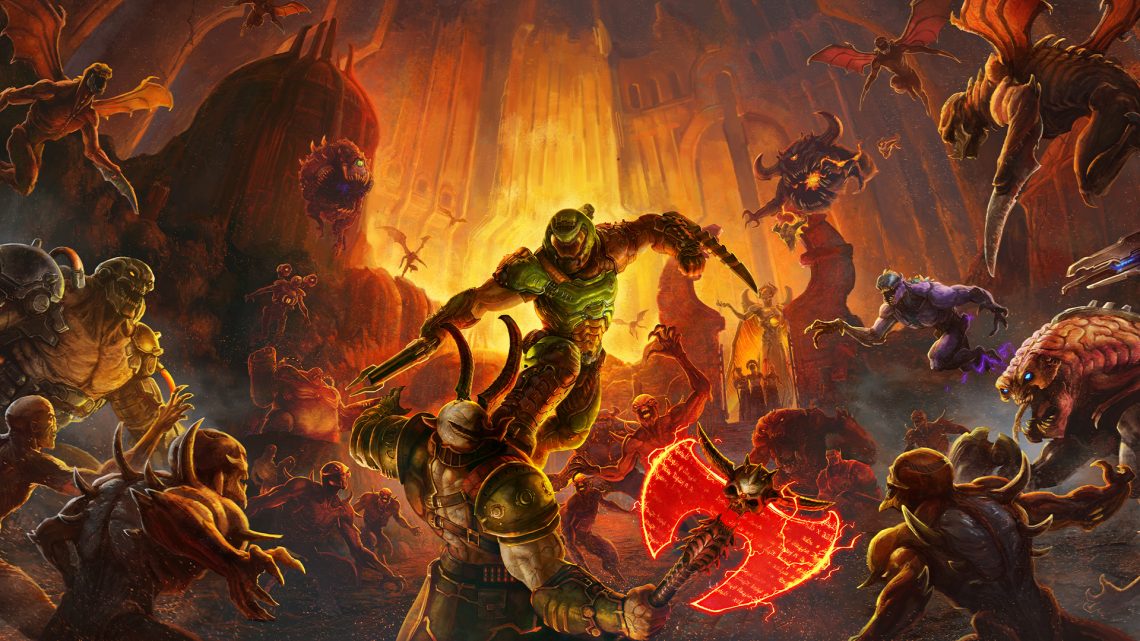
Id Software Learned The Wrong Lessons from ‘DOOM’
March 20, 2020Since this is our 300th(!) episode I just wanted to give my thanks to everyone who’s been listening, whether you're a longtime fan or if this is your first episode, thanks for hanging with us. If you’ve been here for a while, thanks for coming along on this journey with us. Getting to make this podcast week in and week out for the past almost two years, and listening as a fan for the two years before that, has been such an amazing experience. I love working on Waypoint Radio because of this amazing space it fills, a games podcast that is sometimes serious, often hilarious, and always authentic. So thanks for supporting us, for welcoming and allowing my voice on the podcast, and most of all for listening. Here’s to 300 more! You can read an excerpt from today's podcast and listen to the full episode below.
Patrick: It all just left Doom in a very strange place where like Bethesda seemed caught off guard with how much people loved the game, I was caught off guard by how much I loved the game, and what that's what made me so curious about, "Okay, given all this what was their takeaway from what worked in Doom right and what would they do with a sequel?"
Austin: What do they learn from this success? What was the What was your expectation coming to this based on playing like the stuff at E3, did you think going into this like "alright they they got it they got it they got the basics of what what was good about that?" And then and then really the big one is like did they did they?
Rob: Yeah, so it's it's weird. I don't know. I don't know when I got this feeling. Watching previews and trailers and such but I just got the vibe that Doom Eternal was maybe a little too, what's the way to put this? Uh, going back to what Patrick was saying about, with 2016 there's this uncertainty. Did you know what you accomplished here? Like, it's one of those unexpectedly good B movies where you're not entirely sure the creative team behind it knew why the the admixture of components ended up being so special, but it just is. Like you're watching the movie and it's great. It may be great because some weird decisions were made.
Patrick: It's kinda like a movie that like, if you were to look at the raw footage, like this is trash, but then an editor comes in and like saves it. And like Doom in some ways felt like stitched together ideas that, it works, it works, somehow this works! But if I'd say if you were to make a sequel, that same creative team—Yeah, like you're not confident they would come away with the lessons learned from the editor that like stitched it all together,
Rob: Right, and so Doom Eternal, somewhere along the line I got the vibe, maybe even just from the name, but the ways they were covering it, suddenly the stripped down nature of it, the "we're just gonna give you this, you know, extreme shooter experience," I think began to be the thing I was taking away from the marketing and that was that was my fear. And I think what actually surprises me the most about Doom Eternal though as I'm playing it is, if Doom 2016 was basically oppositional in its identity, saying, okay, here's what here's what a lot of modern shooters are doing. We're not doing that. We're not going to let the guy finish what he's saying we're going to cut, our main character is going to cut the cutscenes off, our main character is going to smash the widget that he's supposed to use to save the universe. With Doom Eternal, I am surprised by the degree to which all of that humor has bled out of the experience like Doom Eternal is not charming in that way.
This transcript was edited for length and clarity.
Discussed: Thanks for Listening 00:00, Doom Eternal 21:24, Stellaris 1:05:32, Dialect 1:47:03, Frostpunk: Last Autumn 1:51:24, Mysterium 1:55:35
You can subscribe on Apple Podcasts, Google Play, and Stitcher. If you're using something else, this RSS link should let you add the podcast to whatever platform you'd like. If you'd like to directly download the podcast, click here. Please take a moment and review the podcast, especially on Apple Podcasts. It really helps.
Interaction with you is a big part of this podcast, so make sure to send any questions you have for us to gaming@vice.com with the header "Questions." (Without the quotes!) We can't guarantee we'll answer all of your questions, but rest assured, we'll be taking a look at them.


